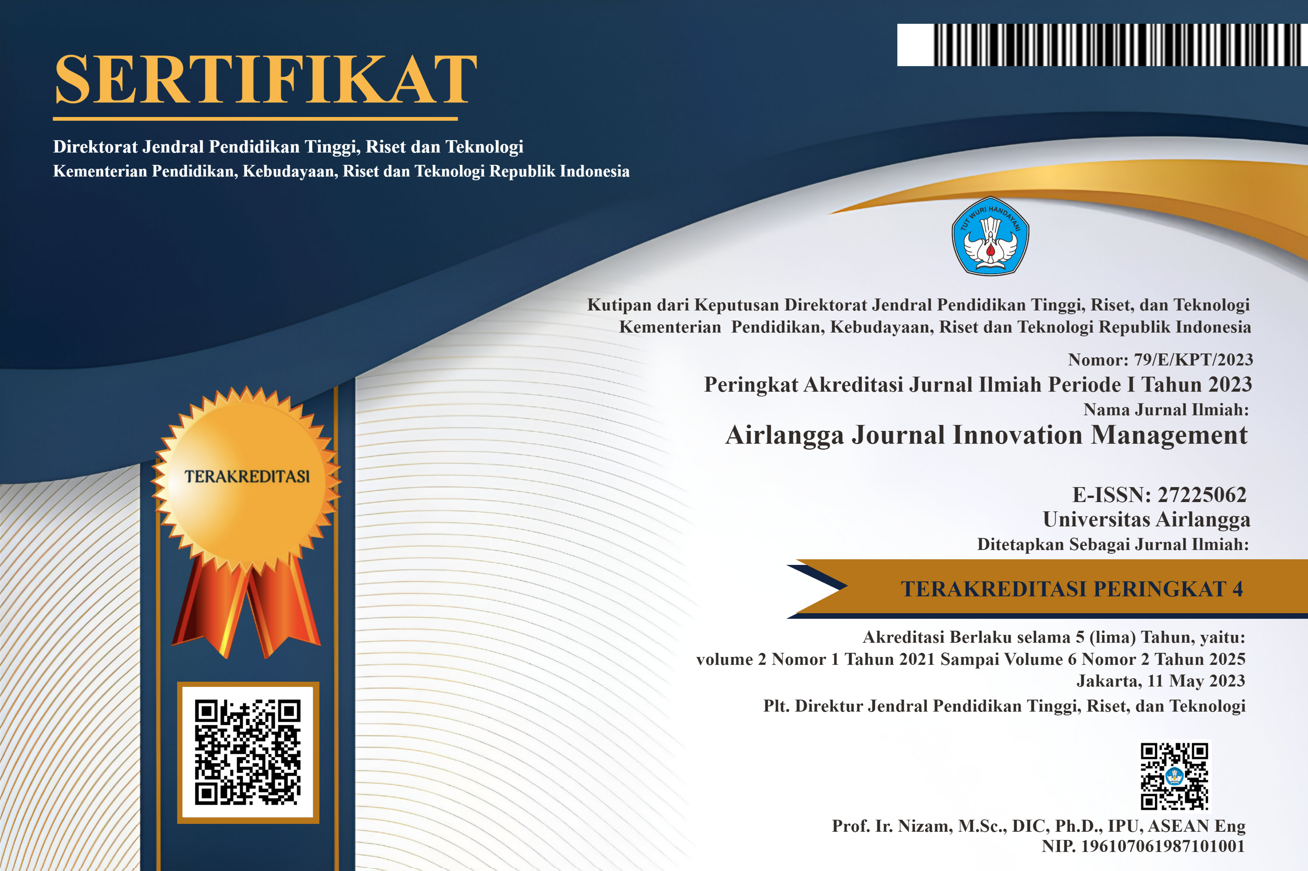THE EFFECT OF PERCEIVED USEFULNESS AND PERCEIVED EASE OF USE ON INTEREST IN USING MOBILE PAYMENT: A CASE ON OVO
Downloads
The acceptance of new technology has become one of the most important areas in information technology. The impact of low consumer interest in using a non-cash payment system (online) is an important problem because it is related to someone's decision to use a non-cash payment system. Currently, consumers have not used the services offered by mobile payment optimally. Efforts to predict a person's interest or consumer behavior in technology acceptance are seen from the perceived usefulness and perceived ease of use. This study aimed to determine the description of behavioral intention, Perceived Usefulness, and perceived ease of use using OVO mobile payment application technology by consumers. The type of research used is descriptive verification, and the method used is an explanatory survey with a purposive sampling technique with a sample of 150 respondents. The data analysis method used is validity and reliability test, path analysis, multiple correlation analysis and coefficient of determination analysis. They are testing this hypothesis through the F test for simultaneous and partial T test using the SPSS 18.0 for windows program. The results showed that simultaneously Perceived Ease of Use and perceived ease of use had a significant effect on behavioral intention of 60.8% and partially, Perceived Ease of Use had a greater influence, namely 60.06%, than Perceived Usefulness of 1.44% to behavioral intentions.
Agudo-peregrina, Á. F., Hernández-garcía, Á., & Pascual-miguel, F. J. (2014). Computers in Human Behavior Behavioral intention , use behavior and the acceptance of electronic learning systems : Differences between higher education and lifelong learning. 34, 301–314. https://doi.org/10.1016/j.chb.2013.10.035
Aritonang, Y. A. L., & Arisman, A. (2017). Pengaruh Persepsi Kemudahan Dan Persepsi Manfaat Terhadap Minat Menggunakan E-Money. Jurnal Akuntansi STIE Multi Data Palembang, x, 1–17.
Atriani, A., Permadi, L. A., & Rinuastuti, B. H. (2020). Pengaruh Persepsi Manfaat dan Kemudahan Penggunaan Terhadap Minat Menggunakan Dompet Digital OVO. Jurnal Sosial Ekonomi Dan Humaniora, 6(1), 54–61. https://doi.org/10.29303/jseh.v6i1.78
Bora, B., Bilgihan, A., Haobin, B., Buonincontri, P., & Okumus, F. (2018). International Journal of Hospitality Management The impact of servicescape on hedonic value and behavioral intentions : The importance of previous experience. International Journal of Hospitality Management, 72(April 2017), 10–20. https://doi.org/10.1016/j.ijhm.2017.12.007
Chuttur, M. (2009). Overview of the Technology Acceptance Model: Origins, Developments and Future Directions. Sprouts Working Papers on Information Systems, 9(37), 9–37. https://doi.org/10.1021/jf001443p
Jannah, N. Z. (2017). Pengaruh Perceived Ease of Use Dan Perceived Usefulness Terhadap Buying Interest Melalui Fitur Gofood Pada Aplikasi Gojek Di Kota. 6(4), 1321–1333.
Lai, P. (2017). the Literature Review of Technology Adoption Models and Theories for the Novelty Technology. Journal of Information Systems and Technology Management, 14(1), 21–38. https://doi.org/10.4301/S1807-17752017000100002
Lie, F., ´bana-Cabanillas, Francisco Mun Ëœoz-Leiva, J. S., ´nchez-Ferna, & ´ndez. (2017). A global approach to the analysis of user behavior in mobile payment systems in the new electronic environment. https://doi.org/10.1007/s11628-017-0336-7
Liébana-cabanillas, F., Marinkovic, V., Ramos, I., Luna, D., & Kalinic, Z. (2018). Technological Forecasting & Social Change Predicting the determinants of mobile payment acceptance : A hybrid SEM-neural network approach. Technological Forecasting & Social Change, 129(December 2017), 117–130. https://doi.org/10.1016/j.techfore.2017.12.015
Liébana-Cabanillas, F., Sánchez-Fernández, J., & Muñoz-Leiva, F. (2014). Antecedents of the adoption of the new mobile payment systems: The moderating effect of age. Computers in Human Behavior, 35, 464–478. https://doi.org/10.1016/j.chb.2014.03.022
Oliveira, T., Thomas, M., Baptista, G., & Campos, F. (2017). Computers in Human Behavior Mobile payment : Understanding the determinants of customer adoption and intention to recommend the technology. Computers in Human Behavior, 61(2016), 404–414. https://doi.org/10.1016/j.chb.2016.03.030
Saha, G. C., & Theingi. (2009). Service quality, satisfaction, and behavioural intentions: A study of low-cost airline carriers in Thailand. Managing Service Quality, 19(3), 350–372. https://doi.org/10.1108/09604520910955348
Wibowo, S. F., Rosmauli, D., & Suhud, U. (2015). Pengaruh Persepsi manfaat, persepsi kemudahan, fitur layanan, dan kepercayaan terhadap minat menggunakan e-money card (studi pada pengguna jasa commuterline di Jakarta. 440–456. https://doi.org/https://doi.org/10.21009/JRMSI.006.1.06
Winayu, N. Y. (2013). Pengaruh Kepercayaan , Perceived Ease of Use Dan Perceived Usefulness Terhadap Minat Menggunakan E-Commerce Forum Jual Beli Dan Perceived Usefulness Terhadap Minat Menggunakan E-Commerce Forum Jual Beli. Skripsi. Fakultas Ekonomi Universitas Negeri Yogyakarta.

This work is licensed under a Creative Commons Attribution-NonCommercial-ShareAlike 4.0 International License.
- The journal allows authors to hold copyright without restrictions and retain publication rights without restrictions. The author retains the copyright and grants the first publication rights to the journal, with his work simultaneously licensed under the Creative Commons Attribution-NonCommercial-ShareAlike 4.0 International License (CC BY-NC-SA). This license allows others to share the work with acknowledgment of authorship and initial publication in this journal, provided that the work is not used for commercial purposes and that any derivative works must use the same license.
- Authors may enter into additional contractual agreements for non-exclusive distribution of the journal publication version (e.g., uploading it to an institutional repository or publishing it in book form), while still including acknowledgment of the initial publication in this journal.
- Authors are allowed and encouraged to upload their work online (e.g., in an institutional repository or personal website) before and during the submission process. This can support productive scientific exchanges as well as increase citations to published works.

AJIM by UNAIR is licensed under a Creative Commons Attribution-NonCommercial-ShareAlike 4.0 International License.





















